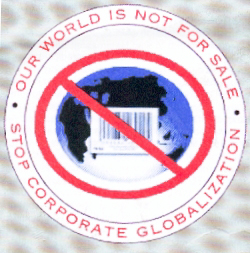The World is Not for Sale
Today, the new French Prime Minister Dominique de Villepin had this to say about the fateful May 30th vote of "non":I'm standing before you at a very particular time of the history of our country, at a time when the French people are expressing their suffering, their impatience, their anger... All spare money in the budget will be dedicated to jobs: this choice means we will have to suspend income tax cuts.
 Though there are many factors that played into the French rejecting the EU's most recent constitution (few of which involve the proposed constitution itself), I believe the French PM clearly addresses the key issue: the woes of globalization. Though the French were the first to make EU history in rejecting the ever-encroaching corporatization of government, they were certainly not the first to do so, nor the last. As the global economy balloons, the rich get richer and the poor get the shaft.
Though there are many factors that played into the French rejecting the EU's most recent constitution (few of which involve the proposed constitution itself), I believe the French PM clearly addresses the key issue: the woes of globalization. Though the French were the first to make EU history in rejecting the ever-encroaching corporatization of government, they were certainly not the first to do so, nor the last. As the global economy balloons, the rich get richer and the poor get the shaft.In just the last fifty years, the global gap between the rich and poor has increased from 1960's 30:1 to 1997's 74:1. The gap grows unabated even in economic powerhouses like the US, where the AP recently reported the wealthiest 20 percent of households in 1973 accounted for 44 percent of total U.S. income. Their share jumped to 50 percent in 2002, while everyone elseÂs fell. For the bottom fifth, the share dropped from 4.2 percent to 3.5 percent. These and many more dire statistics really highlight the consequences of neo-liberal thought and unfettered globalization.
How often, especially in the US, we have come to embrace "laissez-faire" capitalism as some universal, inescapable truth. All of the human race's greatest endeavors are boiled down to commercialism and greed. Like many antebellum Southerners who supported slavery but too poor to own any, many Americans have been blinded by possible wealth, rather than the actual dollars. These days, many economists describe globalization as the great equalizer of wealth, the even hand of God that wreaks havoc to some for the greater good of all. Others emphasize the importance of corporate accountability and human rights within theglobalizationn model. But still fewer question the legitimacy of globalization itself and reject the notion market forces alone should mark our higher aspirations.
The neo-liberal agenda is an extension of "laissez-faire" capitalism on a global scale. The focus of neo-liberalism is the ceding of personal and governmental ownership to the corporate, on every level. This includes, but is in no way limited to, offshoring (replacing jobs inside with jobs outside national borders for cheaper labor), privatization (moving of public funds into private hands), tax incentives (reduction or entire elimination of corporate taxation), merge consolidation (increasing corporate revenue/customers by swallowing other corporations), alliance capitalism (pricing standards and business agreements, intent on reducing markets into economic oligarchies), and free-trade (the removal of all trade barriers between countries with no regard to standard of living or degree of development). What is key to neo-liberal theory is the ignorance of individual government, worker or consumer power, lofting the corporate interests above human rights and governmentsovereigntyy.
The neo-liberal philosophy flies in the face of all logic. Many claims ofefficiencyy, equality, and low-cost are simply doublespeak for "more profit." Thanks to the neo-liberal, the purpose of the economic unit has been redefined into a hunger for no other purpose than greed. All humanachievementt fits narrowly into the bleak existence of Social Darwinism and market forces.
Though this trend will not be derailed overnight, I laud the French people in speaking up. Internationalism should not be so dictated by economics alone, but rather aligned with the better angels of our humanity. Susan George puts it best in her speech at the Conference on Economic Sovereignty in a Globalising World (www.globalpolicy.org):
Look at it this way. We have the numbers on our side, because there are far more losers than winners in the neo-liberal game. We have the ideas, whereas theirs are finally coming into question because of repeated crisis. What we lack, so far, is the organisation and the unity which in this age of advanced technology we can overcome. The threat is clearly transnational so the response must also be transnational. Solidarity no longer means aid, or not just aid, but finding the hidden synergies in each other's struggles so that our numerical force and the power of our ideas become overwhelming.For more information on alternative constructs to globalization and how you can help be apart of the answer, check out the World Social Forum and grassroot organizations like this. Together we can take the world off the auction block!


0 Comments:
Post a Comment
<< Home